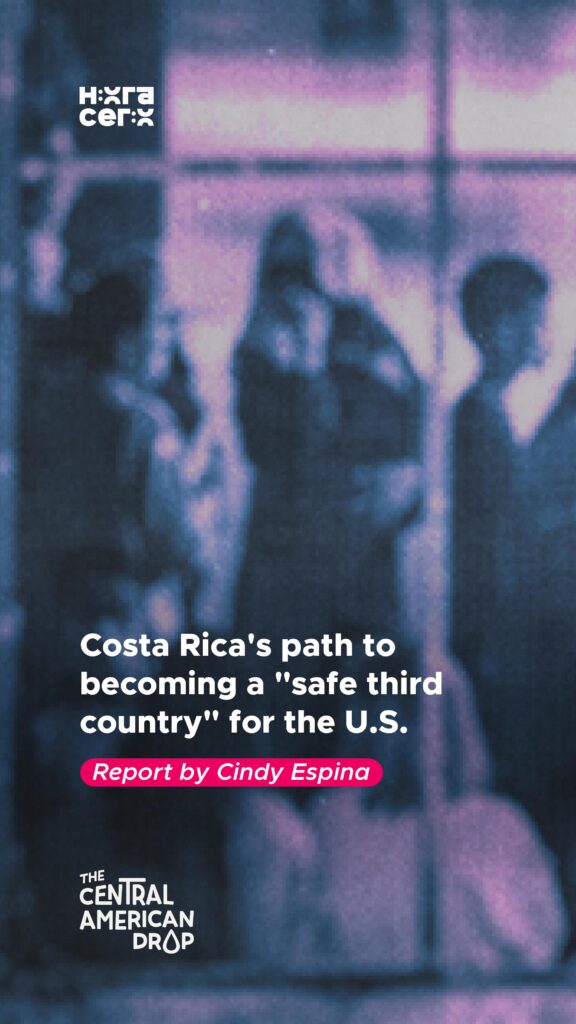
Costa Rica is shifting its policy of migration containment and refugee reception, which primarily serves immigrants from Nicaragua and more recently from Venezuela, and is acting as an extended arm of President Donald Trump’s deportation and border policy. But amid the implementation of this plan, Costa Rican institutions are facing an internal debate: whether to maintain their respect for human rights, for which it has been a regional benchmark, or to circumvent these guarantees to serve their commercial interests with the United States.
On August 1, the news agency Reuters published that the State Department of United States will invest $7.6 million in Costa Rica to facilitate the deportation of immigrants. That same week, it was made public the complete resolution of the Constitutional Court in which the judges state that the 135 people who were deported from the United States on February 20, 2025, were deprived of their liberty in an “illegitimate” manner, hindering their right of transit as immigrants.
These people, most of them of Chinese origin and among whom were 79 minors, were locked up in the Temporary Migrant Care Center (Catem), located in the south of the Central American country, and which was donated by the German company Faber-Castell to be used as a hostel, not as a detention center.
Both the recent agreement reported by the media and the February deportations of refugees aim to ensure that Costa Rica serves as a «safe third country» for Trump’s anti-immigration policies.
But little is known about these agreements and actions between Costa Rica and the United States, where the future of refugees is at stake. That is why human rights and migrant rights advocates have pieced together the puzzle that now appears to be Costa Rica’s plan to become a safe third country.
The government of Costa Rican President Rodrigo Chaves handles this issue with great opacity and a lack of transparency. Migrant advocates in Costa Rica told Hora Cero that since the Constitutional Court issued its ruling, everything related to the deportation of people from the United States has remained hidden. Therefore, it is unknown when the agreement will begin to operate, nor is it known whether the Costa Rican government, through the Migration Institute, will be in charge of its implementation or whether it will be implemented by United Nations agencies such as UNHCR or IOM.
Professor Carlos Torres of the National University of Costa Rica explains that Trump’s presidency changed the paradigm of migration management in the Central American country and has also modified the rigor and respect for human rights that characterized it for many years. For Torres, all these actions by the Costa Rican government have a transactional logic; however, amid these opaque negotiations, institutions that guarantee human rights, such as the Ombudsman’s Office, still operate and, together with other civil society organizations, have tried to demand that respect for people’s rights be maintained through the courts.
Costa Rica is the Central American country with the second-highest tariffs imposed by the United States. The tariff rate is 15%, 3% lower than in Nicaragua, which is the country most affected by Donald Trump’s new trade policy. The percentage imposed on Costa Rica is due to the fact that it sells more than it buys from the United States, and this is inconsistent with Trump’s economic logic: America (the United States) first.
Carlos Torres believes that the Costa Rican government is seeking to cushion or reduce this trade blow with agreements related to deportations and becoming a safe third country. It has also taken other decisions aimed at improving relations with the U.S., such as the recently approved constitutional amendment authorizing the extradition of Costa Rican citizens wanted by the United States for their involvement in drug trafficking and terrorism.
Since U.S. Secretary of State Marco Rubio’s visit to Central America, Central American countries have begun implementing a series of migration control, securitization, and criminalization policies. Hora Cero reported and analyzed at that time that the decisions regarding the deportation and imprisonment agreements for migrants between the United States and the governments of Guatemala, El Salvador, Honduras, Costa Rica, and Panama brought with them other individual interests for the rulers of those countries, where migrants were used as «bargaining chips,» according to internationalist Lady Junek Vargas.
Guatemala: The agreement focuses on strengthening security, with the presence of military personnel at the borders and the installation of devices to collect biometric information from people transiting through Guatemala.
El Salvador: The agreement is based on using the CECOT as a detention center for deportees with alleged criminal records. However, it has not been proven that the individuals affected by this agreement have committed a crime.
Honduras: The agreement involves deporting people from Venezuela so they can take another plane from that country to their home country.
Panama: The agreement is based on serving as a deportation bridge for people from Venezuela, Colombia, Haiti, and other countries in Asia and Africa.

| Cookie | Duración | Descripción |
|---|---|---|
| cookielawinfo-checkbox-analytics | 11 months | This cookie is set by GDPR Cookie Consent plugin. The cookie is used to store the user consent for the cookies in the category "Analytics". |
| cookielawinfo-checkbox-functional | 11 months | The cookie is set by GDPR cookie consent to record the user consent for the cookies in the category "Functional". |
| cookielawinfo-checkbox-necessary | 11 months | This cookie is set by GDPR Cookie Consent plugin. The cookies is used to store the user consent for the cookies in the category "Necessary". |
| cookielawinfo-checkbox-others | 11 months | This cookie is set by GDPR Cookie Consent plugin. The cookie is used to store the user consent for the cookies in the category "Other. |
| cookielawinfo-checkbox-performance | 11 months | This cookie is set by GDPR Cookie Consent plugin. The cookie is used to store the user consent for the cookies in the category "Performance". |
| viewed_cookie_policy | 11 months | The cookie is set by the GDPR Cookie Consent plugin and is used to store whether or not user has consented to the use of cookies. It does not store any personal data. |